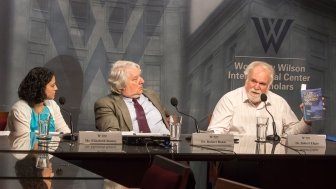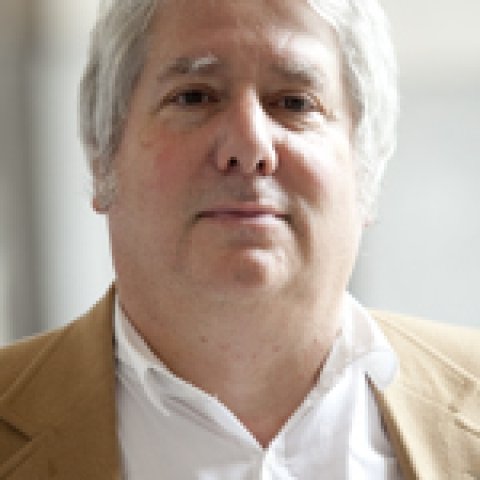Robert M. Baum
Fellow
Professional Affiliation
Associate Professor and Chair, Department of Religious Studies, University of Missouri-Columbia
Expert Bio
Robert Baum was born in Washington and grew up in Silver Spring. He attended Wesleyan University for his bachelor’s degree, where he first took a course on Apartheid and decided to concentrate in African history. Upon graduation, he received a Watson Fellowship, which enabled him to spend an entire year in a Diola village in southern Senegal, where he learned the language and began field research, before beginning graduate school at Yale University. He returned to Senegal for nearly two more years, and did archival work in London and Paris in preparation of his Ph.D. His first book, Shrines of the Slave Trade: Diola Religion and Society in Pre-Colonial Senegambia won an American Academy of Religion award for the best first book in the history of religions (2000). He has written numerous articles on the history of Diola religion, field research, religious constructions of gender, indigenous religions and is currently completing a book on the history of Diola women’s prophetic movements.
He is currently chair of the Religious Studies Department at the University of Missouri-Columbia and has previously taught at Iowa State University, Kenyon College, The Ohio State University, Bryn Mawr College, and Barnard College. He has also played an extensive role in the Ford Foundation funded program “Difficult Dialogues” which trained faculty at the University of Missouri and in other Big Twelve universities in how to deal with controversial issues that have a religious dimension in the university classroom. He has conducted similar workshops for K-12 teachers
Education
B.A. High Honors in History, Wesleyan University; Ph.D. African History, Yale University
Wilson Center Project
“From Many Paths: A History of African Religions”
Project Summary
Wherever protracted conflicts threaten the existence of African states, long-standing religious conflicts play a central role. Although some scholars have interpreted the centrality of religious factors in the political life of African states as a sign, as John Mbit once said, that Africans are “notoriously religious,” I would argue that the centrality of religions has more to do with the long history of state-sponsored religions, in which heads of state performed rituals or supervised religious specialists who worked to ensure the spiritual well-being of the entire nation. The profoundly this-worldly focus of African religious traditions reinforced this, as did a greater emphasis on the practicalities of daily existence even among African Christians and Muslims. Religious ideas and practices have shaped the way that African societies have engaged in politics, war, agriculture, trade, and medicine, among other things. During the period of European colonization, the centrality of religious organizations was reinforced by their new roles as primary sources of resistance to foreign domination and as alternative sources of legitimate authority. In the post-colonial the relative weakness of civil society, has fueled the persistence of religiously based political movements in many African states as we begin the twenty-first century.
The historical study of African religious traditions provides a critically important means of understanding the way that Africans reflect upon the profound political, economic, and social changes that have been so important to the shaping of African societies. This study will be continent-wide in focus, concentrating on the sustained interaction between practitioners of indigenous African religions, Christians and Muslims from our earliest archaeological evidence of the origins of humanity (and religion) to the post-colonial era.
Major Publications
- Shrines of the Slave Trade: Diola Religion and Society in Precolonial Senegambia, New York: Oxford University Press, 1999.
- “Prophetiess: Alinesitoue as a Contested Icon in Contemporary Senegal, in Toyin Falola and Fallou Ngom, editors. Facts, Fictions and African Creative Imaginations, New York: Routledge, 2010.
- “Slaves Without Rulers: Domestic Slavery among the Diola of Senegal,” in Jay Spaulding and Stephanie Beswick, editors, African Systems of Slavery, Asmara, Eritrea and Trenton, N.J. : Red Sea Press, 2010.
- “Secrecy, Shrines, and Memory: Diola Oral Traditions and the Slave Trade in Senegal,” in Andrew Apter and Robin Derby, editors, Activating the Past: Historical Memory in the Black Atlantic, Cambridge: Cambridge Scholars Press, 2010.
- “From a Boy not Seeking a Wife to a Man Discussing Prophetic Women: A Male Fieldworker among Diola Women in Senegal, 1974-2005, Men and Masculinities, 2008.
- “Crimes of the Dream World: French Trials of Diola Witches in Colonial Senegal,” International Journal of African Historical Studies, 2004, V. 37, #2.
- “The Ethics of Religious Studies Research in the Context of the Religious Intolerance of the State: An Africanist Perspective,” Method and Theory in the Study of Religion, 2001, V. 13.
- “Alinesitoue : A Diola Woman Prophet in West Africa,” in Nancy A. Falk and Rita M. Gross, editors, Unspoken Worlds: Women’s Religious Lives, Belmont, CA: Wadsworth, 2001, Third Edition.
- Marilyn R. Waldman, Prophecy and Power: Muhammad and the Qur’an in the Light of Comparison, edited by Bruce B. Lawrence with Lindsay Jones and Robert M. Baum, London: Equinox Publishers, forthcoming, 2011.
- Marilyn R. Waldman with Robert M. Baum, “Innovation as Renovation: The ‘Prophet’ as a Agent of Change,” in Michael Williams, et al. Innovation in Religious Traditions: Essays in the Interpretation of Religious Change, Berlin: Moton de Gruyter, 1992.
Insight & Analysis by Robert M. Baum
Filter
- Past event
- Religion
Book Launch: West Africa’s Women of God


